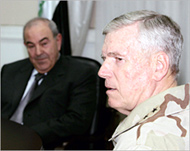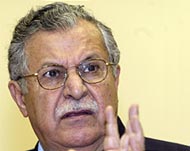Iraq assembly gets ready to convene
Iraq will put its democracy to the test by convening its first freely elected National Assembly in recent history after last-minute bargaining over Sunni Arab candidates to head the parliament.

Shia Muslim officials said they failed to reach final agreement in talks with the Kurds – whose leaders last month said they sought a “federal, democratic, pluralist and united Iraq” – and the Sunni Arabs.
But those failures were not enough to prevent the 275-member National Assembly from preparing to meet on Wednesday for the first time since the 30 January elections.
Historic event
“It will be a historic event because the Iraqi people will witness an elected parliament for the first time in their lives,” said Ali al-Dabagh, a member of the Shia clergy-dominated United Iraqi Alliance, which won the most seats in the elections.
|
“It will be a historic event because the Iraqi people will witness an elected parliament for the first time in their lives” Ali al-Dabagh, United Iraqi Alliance |
Al-Dabagh added that Shia, Kurdish and Sunni Arab politicians would meet after the deputies were sworn in “to finalise things. We need two to three days to announce an agreement”.
The Shia alliance won 140 seats in the National Assembly but needs the Kurds’ 75 seats to assemble the two-thirds majority required to elect a president, who will then nominate the prime minister.
The assembly was to start with speeches from members of the interim government, followed by political party leaders, and end with a swearing-in ceremony, officials said, adding that the parliament could meet over a number of days.
Parliamentary speaker
Shia talks with Sunni Arabs focused on naming a parliament speaker, and it remains unclear if they will present a candidate on Wednesday.
Although the speaker’s role is mostly restricted to presiding over the assembly and moderating discussions, the job has a great deal of visibility.
Including Sunni Arabs in the political process is seen as a way to isolate anti-government and anti-US fighters.
 |
|
Myers (R) predicts violence will |
US General Richard Myers, chairman of the Joint Chiefs of Staff, predicted that violence would surge in the weeks ahead as the National Assembly convened and the government took shape.
“So there’s a long way to go,” Myers said, before Iraq is stable enough to defend itself without the presence of US troops, which now number about 148,000. He declined to say when a US withdrawal might begin.
Coalition government
The United Iraqi Alliance and a Kurdish coalition agreed last week to form a coalition government with Shia politician Ibrahim al-Jafari as prime minister.
In return, Jalal Talabani will become Iraq‘s first Kurdish president, a largely ceremonial post.
 |
|
Jalal Talabani will become Iraq’s |
“The Kurds want to make some amendments on the deal, and we are going to finish soon, Thursday to be exact. We do not want to impose any name from our side regarding the post of the parliament speaker. We want the Sunnis to nominate some persons for this post, but till now they have not done this,” al-Dabagh said.
Sunni Arab negotiators at Tuesday’s meeting included interim President Ghazi al-Yawir – a possible choice for parliament speaker – the Iraqi Islamic Party and Iraqi nationalist leader Adnan Pachachi.
Sunni Arabs largely stayed away from the January elections, either to honour a boycott call or because they feared being attacked at the polls by fighters.